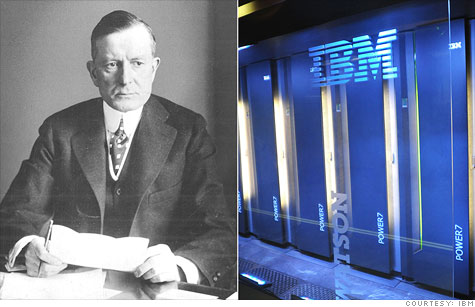
From Thomas Watson Sr. (left) to Watson the Jeopardy! playing computer, IBM has had quite a century. Click here to see some of the inventions IBM cast aside.
NEW YORK (CNNMoney) -- "The whole organization is enthusiastic about the rapidly increasing business."
That's a line from the first annual report of the Computing-Tabulating-Recording Co., an amalgam of technology businesses that merged and incorporated on June 16, 1911. The company was renamed International Business Machines (IBM, Fortune 500) in 1924.
100 years later, the business is still "rapidly increasing."
The tech giant's stock hit an all-time high as recently as last week, and a week earlier, it passed Microsoft (MSFT, Fortune 500) to become the second-most valuable tech company on the market. (Microsoft has since edged back past IBM, but it's a neck-and-neck race.)
The reason for IBM's success has been well-documented: The company has largely succeeded in foreseeing the changing landscape of technology and adjusting its product mix accordingly.
"We've sold off businesses that sometimes we've been attached to, because we must invest in high-value spaces to serve our enterprise customers," said Martin Schroeter, IBM's Treasurer, in a recent interview.
Of course, it hasn't always worked. There was that "blip" in the 1980s when IBM continued to push hard on mainframes when it was clear that personal computers were becoming the preferred technology, even for businesses.
But lately, IBM's gambles on the future have paid off. The company's transition from hardware to services -- and now, to software and analytics -- have helped earnings more than double over the past decade. IBM's gross margin has grown 9 percentage points, and the company has generated $109 billion in free cash flow since 2000. A full $60 billion went right back into research and development.
IBM believes that realignment and reinvestment will pay off in the long term. By 2015, the company expects to nearly double 2010's per-share operating earnings to $20.
Big Blue has come a long way from those days in 1911, when its annual profit amounted to $950,920.43 and it had just 1,346 employees.
The company started after the Computing Scale Co., Tabulating Machine Co. and International Time Recording Co. -- three seemingly incompatible companies -- merged.
Somehow it all worked. Thomas Watson took the company's reins as president in 1915, and by 1920, the company had grown its income 14-fold and doubled its headcount.
Over the years, IBM invented the punch card, the electric typewriter, the mainframe, the scanning tunneling microscope, the Web server, the hard drive, and nanotubes. It even developed what was technically the world's first software - a plug board used in one of its early tabulation machines.
Its inventions haven't slowed. IBM's 5,896 patents in 2010 were the most of any company in the world.
IBM credits much of its success to its engineers and scientists. Watson challenged his employees with a one-word mission statement: "Think." That became the company's slogan, emblazoned across IBM buildings around the world.
The CEO was also notoriously ahead of his time in his views on human resources. For instance, Watson created an "open door policy" for employee complaints, coining a phrase and management style still in wide use half a century later. By 1935, IBM became one of the first companies to train and hire female engineers. The company hired its first black salesman in 1946. And Watson's son, Thomas Watson, Jr., instituted the company's first equal opportunity policy in 1953.
It's been a pretty good century for IBM. The world's current most valuable tech company -- Apple (AAPL, Fortune 500) -- will have to stay savvy for another 65 years to match Big Blue's centennial record. ![]()